

Exploring the capabilities of live video cameras on the microscope: we put Blackmagic’s professional 4K/6K studio cameras to the test
Blackmagic studio cameras are designed for professional studio use. Their cutting-edge camera technology, standout studio capabilities and appealing price point make these cameras a viable alternative to conventional microscope cameras.
A design that prioritises stationary applications, a powerful image sensor, a large screen, network connectivity and streaming capabilities – all these are essential prerequisites for modern digital microscopy and are features offered by Blackmagic cameras. With our LM digital adapters with built-in precision optics, these studio cameras can be attached to almost any microscope, delivering crystal-clear images in 4K or 6K resolution.
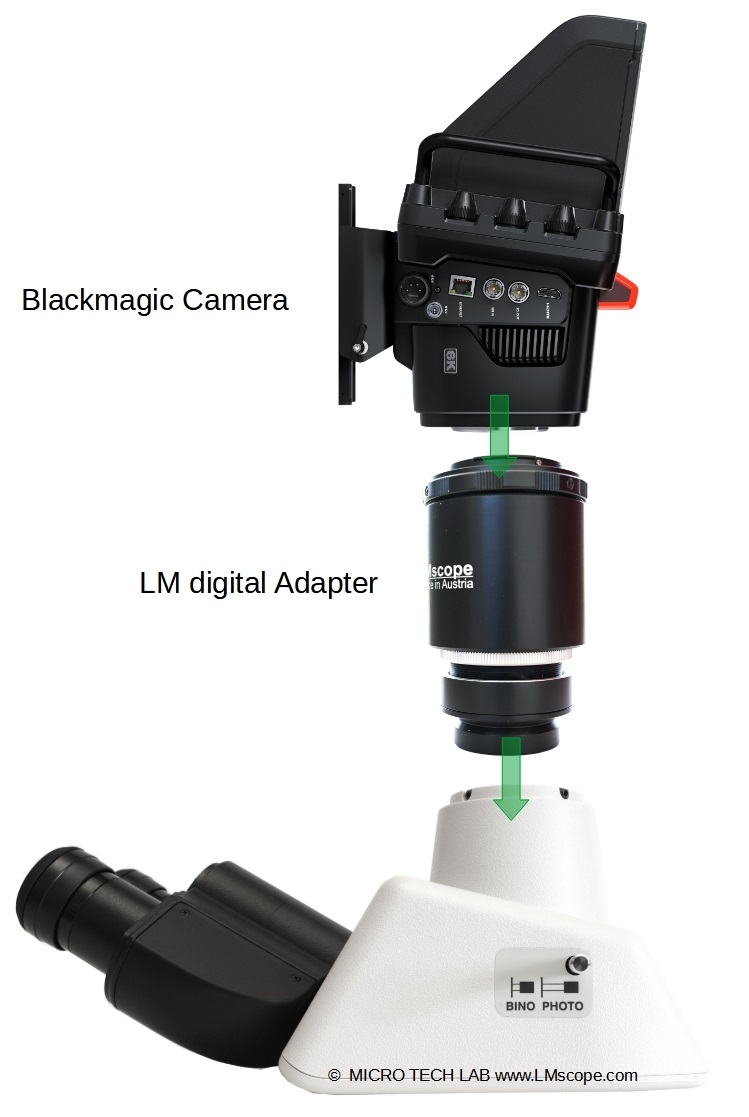
Are you looking to visually engage with your clients or patients in real-time discussions? Simply connect the camera to a high-definition, large monitor via HDMI to share live footage with multiple viewers. The 7-inch touchscreen is a good size, with knobs to the right for controlling brightness, contrast and peaking.
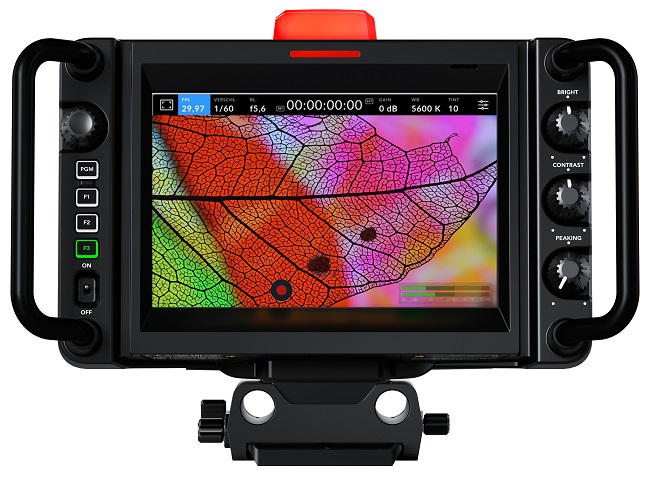
Key specifications:
- High-grade, large Super 35 sensor (equivalent to APS-C), even extending to full-frame capabilities
- 6K video recording at up to 60 fps, also in UHD or 5.3K resolution
- EF bayonet mount
- Large 7-inch touchscreen
- Powered by 12V power supply
- Professional audio recording with integrated stereo microphone
- Direct live streaming via 10GBASE-T Ethernet connection
- HDMI port
- 12G SDI connector for high-resolution video transmission
- High light sensitivity (ISO 100 – 25,600)
- 13 stops dynamic range
- Remote camera control with the Bluetooth+ for Blackmagic app for Apple devices
Blackmagic has three camera lines suited for microscopy applications, each of them featuring models in both 4K and 6K resolutions:
1.) Blackmagic Pocket Cinema cameras
2.) Blackmagic Cinema cameras
3.) Blackmagic Studio cameras
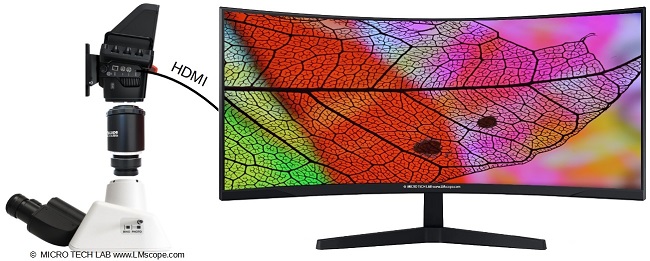
The cameras also come with an Ethernet port, enabling direct live streaming to many popular platforms such as YouTube, Facebook Live and Twitch.
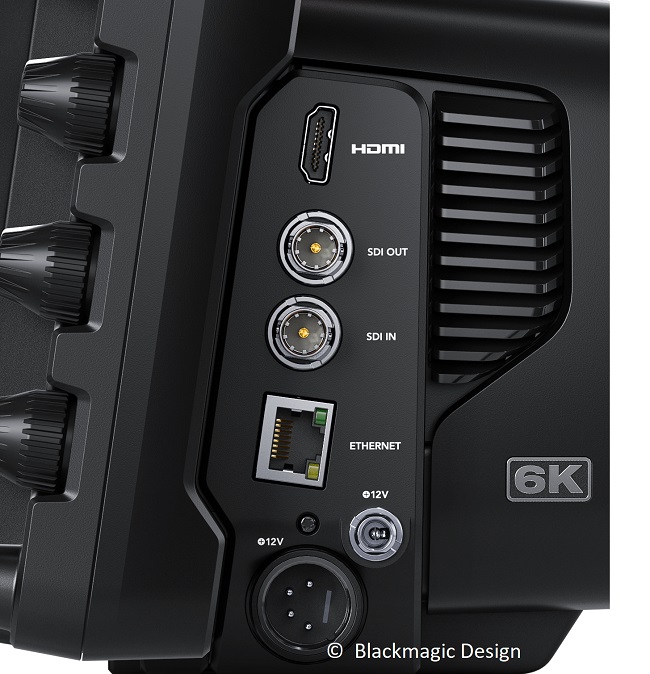
This integration of Ethernet technology simplifies the setup with just a single cable for receiving and transmitting camera data and also cuts down costs compared to the standard SMPTE fiber optic cables. The required infrastructure is usually in place. The audio features, a critical element for any studio camera, enable audiences worldwide to listen in on detailed commentary and ambient sounds, thus providing a more immersive experience. Cameras with a feature set of this calibre typically come with a price tag starting at EUR 10,000.
Recording high-definition video in 6K and capturing RAW files takes up huge amounts of storage space. To accommodate this, the Blackmagic studio cameras let users record files directly onto external SD cards and SSD drives, thus ensuring that the workflow remains uninterrupted.
All models have a 12-volt power supply with a secure locking connector that ensures an uninterrupted power feed for continuous camera operation. If an Ethernet cable is used to connect to the camera, then the whole camera is powered from the Ethernet connection.
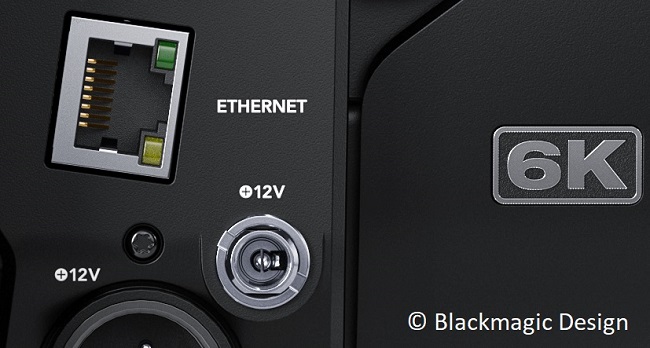
The cameras are equipped with an active or passive cooling system and built-in ND filters, which significantly reduces the chances of the sensor overheating, thereby ensuring that even during prolonged use over several hours, the risk of image degradation due to high temperatures is minimised.
The built-in filter wheel with 2, 4 or 6 stop IR (infrared) filters allows users to reduce the amount of light reaching the camera’s sensor if needed. In video mode, this is the only way for cameras to avoid overexposure or, in severe scenarios, damage to the image sensor from overheating. For specialised microscopy applications, this feature opens up new possibilities for maximising the dynamic range of the image sensor.
Conclusion: Featuring state-of-the-art camera technology and an appealing price point, Blackmagic’s innovative studio cameras excel as specialised video cameras for microscopy applications.
14.10.2024New LM Digital Adapter for: Sony Alpha 9 III / Nikon Z9 / Nikon Z8 / Sony Alpha 7R V / Sony Alpha 1 II / Sony Alpha 1 / Sony Alpha 9 II (ILCE-9M2) / Sony FX3 Cinema Line / Sony Alpha 9 / Nikon D6 / Canon EOS R3 / Canon EOS R6 Mark II / Canon EOS R8 / Sony Alpha 7R IV / Canon EOS R5 II / Nikon Z6III / Canon EOS R5 / Sony Alpha 7S II / Sony Alpha 7S III / Sony Alpha 7R III / Canon EOS R6 / Nikon Z6 / Nikon Z6II / Sony Alpha 7R II / Nikon Z7 / Nikon Z7II / Canon EOS R / Canon EOS Ra (Astro) / Nikon Z5 / Sony Alpha 7C / Canon EOS RP / Sony Alpha 7S / Canon EOS R7 / Leica SL2-S / Canon EOS R10 / Nikon Z50 II / Canon EOS 1D X Mark III / Nikon Z50 / Nikon Z30 / Nikon Z fc / Nikon D850 /